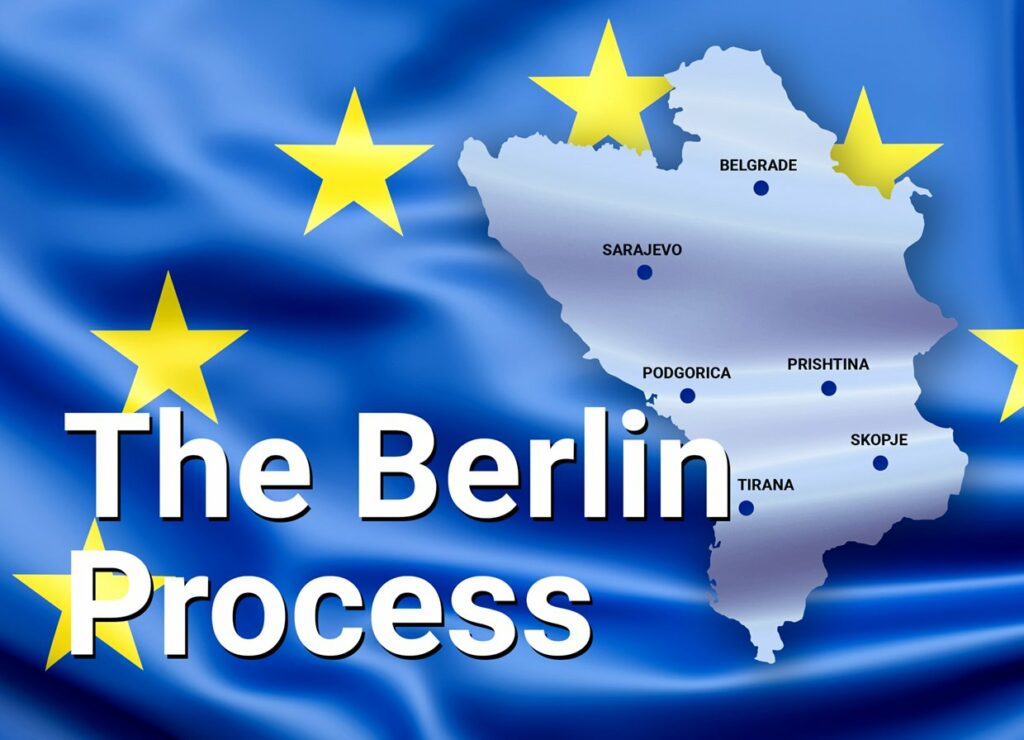The Berlin Process celebrated its 10th anniversary yesterday in Berlin, but the Western Balkans still don’t have much to celebrate.
Almost no country in the region has progressed enough on its path to the European Union (EU) to consider membership imminent. Nevertheless, European officials continued to send encouraging messages, stating that they see the EU’s future together with the Western Balkans as part of it.
The region’s journey toward the European Union has long turned into a drama reminiscent of Samuel Beckett’s Waiting for Godot, with local officials sincerely hoping they won’t have to wait for another milestone anniversary just to hear more promises and encouraging messages from Brussels or sign a common market agreement. After a decade, it’s fair to ask: is the Berlin Process a waiting room or a fast track on the road to Europe?
“Germany seeks to return as Europe’s leading nation”
Diplomat Zoran Milivojević told Blic that Germany’s interest in reviving the Berlin Process at the anniversary celebration is clear.
“Germany and the West want the Berlin Process to become a key mechanism in the enlargement process, especially considering that enlargement is now a priority on the European agenda, as well as the Growth Plan, which includes six billion euros for the Western Balkans. Germany sees an opportunity to reassert itself as Europe’s leading nation and to show that it still holds influence in the Western Balkans,” Milivojević explained. He added that the Berlin Process should serve as “a kind of momentum for the enlargement policy.”
“Germany has also shown that when it wants to, it can influence Priština and Albin Kurti. Under pressure from Berlin, Kurti partially restored the free flow of Serbian goods in Kosovo and Metohija. This was also a condition for unblocking the CEFTA agreement and moving forward with the establishment of a regional market,” Milivojević noted.
Europe faces three problems
Milivojević added that the EU is accelerating the enlargement process to anticipate the resolution of the war in Ukraine, but he believes Europe is facing three key problems:
The war in Ukraine,The issue of reforms within the EU,Political tensions in the EU, as sovereigntist tendencies are gaining strength.
Regarding enlargement, Milivojević believes that “everything is still far off” and that “Montenegro is currently closest to the EU because it has no unresolved issues related to state borders.”
“Montenegro’s entry into the EU could demonstrate that both the Berlin Process and EU enlargement are still alive. However, geopolitics remains at the forefront, with the West practically forcing Ukraine into the EU, despite questions about when a country at war will be ready for membership,” Milivojević concluded.
“The most important thing is that discussions are happening in this format”
On the other hand, Ognjen Pribićević, a former ambassador to Germany and the UK and a scientific advisor at the Institute of Social Sciences, said that the first and most important thing is that discussions are taking place in this format, especially after the wars of the 1990s.
“That’s a big step forward. We’ve seen some concrete progress, particularly for young people, diplomas, and roaming, though this is also part of other organizations and projects. Still, considering where we were before, it’s not insignificant. However, it’s also true that much more was expected—not just from this format, but also from enlargement in general,” Pribićević told RTS.
According to him, the Berlin Process fundamentally represents Europe’s, primarily Germany’s and France’s, desire to maintain momentum in the enlargement policy.
“Europe has long passed its peak”
Pribićević warned that the worst-case scenario would be if the conflicts in Ukraine and the Middle East further delayed this process, and he pointed out that there hasn’t been a clear strategy for at least two decades.
“Europe reached its peak long ago, several decades ago, and it is now in a period of serious decline, facing significant challenges. Just look at the migration crisis or the issues that will soon cause more conflicts with America, such as defense spending or the crisis in values. But this is natural and normal. Civilizations rise and fall. In that sense, Europe is in crisis, but it remains the centre of the world for many people,” Pribićević concluded.
(Blic, 15.10.2024)
https://www.blic.rs/vesti/politika/berlinski-proces-obelezio-10-godina-postojanja-za-balkan-je-on-cekaonica-ili-brza/2y56yyw
This post is also available in: Italiano
Source link : http://www.bing.com/news/apiclick.aspx?ref=FexRss&aid=&tid=670e33498da54adaba671842bf13aa2f&url=https%3A%2F%2Fwww.serbianmonitor.com%2Fen%2Fthe-berlin-process-marks-10-years-but-the-western-balkans-is-still-on-standby%2F&c=14128516928299780577&mkt=en-us
Author :
Publish date : 2024-10-15 02:13:00
Copyright for syndicated content belongs to the linked Source.
